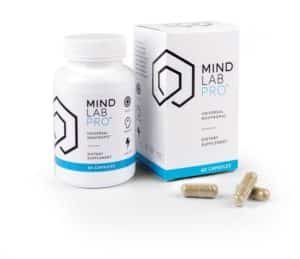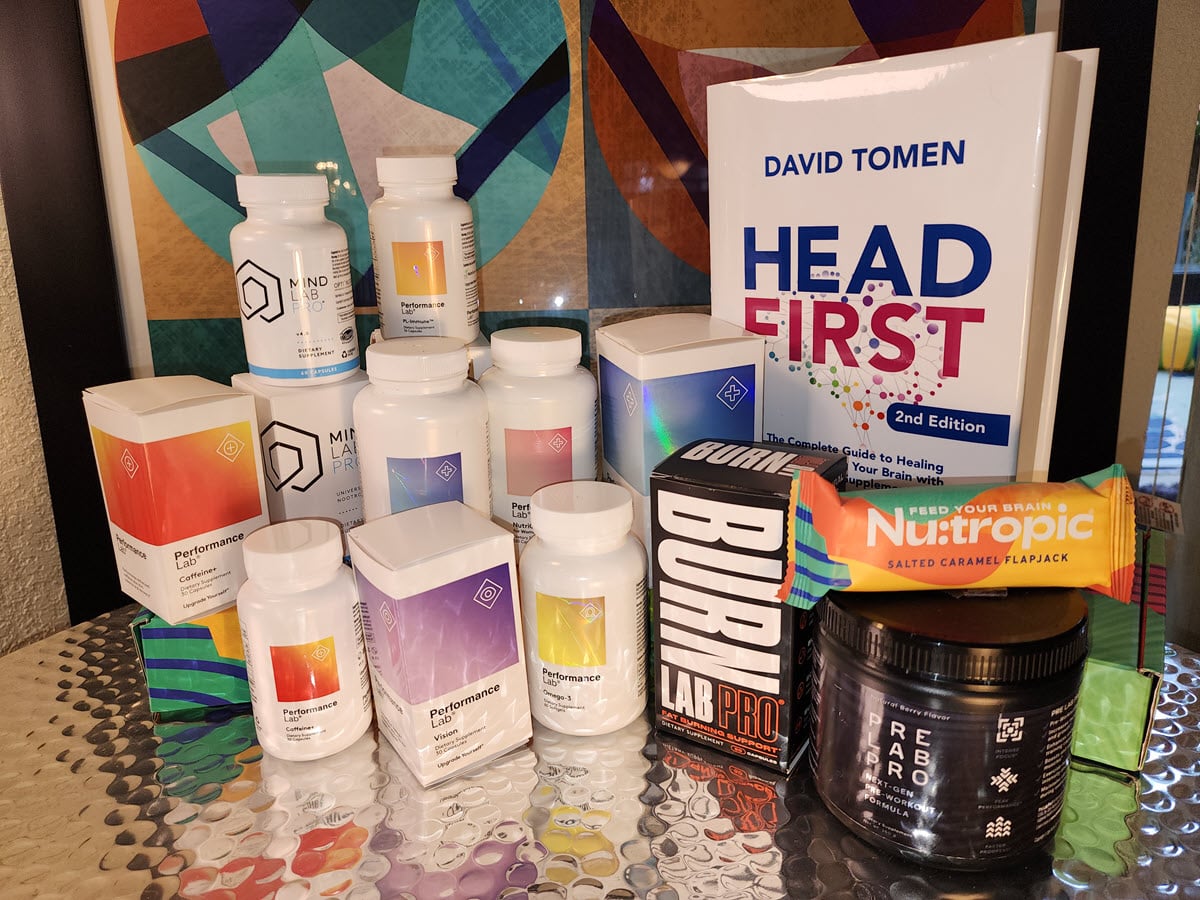Table of Contents
We all want to know the best nootropics for 2025. So, in this post I’ll cover the fundamentals for supporting great cognitive performance and brain health.
Here you will find the best natural nootropic supplements for boosting decision-making, learning & memory, focus, energy, and motivation.
Key Takeaways
- Comprehensive list of nootropics categorized based on their effects such as memory enhancement, mood improvement, and increased focus.
- Detailed explanation of each nootropic including its benefits, mechanism of action, and recommended dosages.
- Mention of natural nootropics like Bacopa Monnieri and synthetic ones like Noopept, providing a diverse range of options.
- Thorough reviews on the safety and potential side effects of different nootropics, ensuring informed decision-making.
- Guidance on creating personalized nootropic stacks by scheduling a consultation with me if you find this too difficult. Go to my calendar here and let’s get started: Click here to schedule an hour with me
But the best nootropic supplements for 2025 for you depends on what you are trying to fix. Or support. Maybe you’re looking for a natural replacement for a med you’re using.
The beauty of the nootropics list below is these supplements can also help reduce anxiety, depression, OCD, and even PTSD. They’ll also help with age-related cognitive decline.
You can help your brain and cognitive function with individual supplements like I’ve listed below. But I have also found over years of hacking my own brain, that you can simplify the list of supplements you use if you narrow your choices down to only 5 categories for brain optimization.
Those brain hacking categories look like this …
Best Nootropics for … |
Recommended nootropics |
Processing speed, Decision-Making, Focus, Flow, & Thinking |
Acetyl-L-Carnitine, CDP-Choline, Lion’s Mane, Magnesium, L-Tyrosine, Vitamin D, DHA, B-Complex |
Learning & Memory |
Bacopa Monnieri, CDP-Choline, DHA (Omega-3), Magnesium, Phosphatidylserine (PS), Pine Bark Extract, L-Tyrosine, Vitamin D, B-Complex |
Anxiety & Depression |
CDP-Choline, Bacopa Monnieri, Magnesium, Rhodiola Rosea, B-Complex, Vitamin D |
Energy & Motivation |
Caffeine, Acetyl-L-Carnitine, CoQ10, L-Theanine, MCT Oil, Rhodiola Rosea |
Brain Repair & Maintenance |
Acetyl-L-Carnitine, Astaxanthin, CDP-Choline, DHA, Lion’s Mane, Magnesium, Phosphatidylserine (PS), Rhodiola Rosea, Pine Bark Extract, Vitamin D |
Best Nootropic Supplements in 2025
I have my favorite nootropics after 18-years of trial and error. And I’ll share what I’ve found and use in this article. Because what works for me may work well for you too. The nootropics I’m talking about here are what I use every day.
The thing is, the categories in the table above are some of the most popular nootropic supplements used today. And each one works in multiple areas of cognitive enhancement. This means you can use fewer capsules in a well-rounded nootropic stack.
I encourage you to invest a little time and learn how each nootropic works in your brain. I know this can be hard. The reason I’m encouraging you to learn this stuff at least on the basic level is because you’ll find that many of these compounds work in synergy. This means you can use smaller doses of each supplement for a bigger benefit.
The key to success with nootropics is having the willingness and determination to learn and experiment and find out what works best for you.
There is no “one pill” solution for repairing and optimizing your brain. It often takes several carefully chosen supplements to get the job done.
Pre-Made Nootropic Stack Benefits
 Fortunately, I found the best pre-made nootropic stack in late 2015 which includes most of the nootropics I’d selected for my stack. All packed into 2 capsules in a natural pre-made nootropic stack called Mind Lab Pro® .
Fortunately, I found the best pre-made nootropic stack in late 2015 which includes most of the nootropics I’d selected for my stack. All packed into 2 capsules in a natural pre-made nootropic stack called Mind Lab Pro® .
I’ll talk more about Mind Lab Pro® in a few minutes and how it ties into my brain hacking goals.
The company that makes Mind Lab Pro® also produces a line of dietary supplements called Performance Lab®.
And before I go to the gym, I mix a glass of Pre Lab Pro®. It contains ingredients for mental clarity, more energy, improves cognitive function, better muscle performance and growth, and quicker recovery,
Click for Performance Lab® Energy
Click for Performance Lab® Caffeine 2
Click for Performance Lab® Omega-3
Choose the Best Nootropic Supplement Stack for You in 2025
If you are new to nootropics, or have years of experience but need a refresher on building your own nootropic stack, see my articles:
Beginners Guide to Nootropic Stacks
How to Create the Best Nootropic Stack
Improve Brain Function with the Best Nootropic Supplements to buy in 2025
 Each of the nootropics I detail below contain links through to my full review.
Each of the nootropics I detail below contain links through to my full review.
When you click through to each individual nootropic supplement review you’ll find more detail on what it is, why we use it as a nootropic, how it feels, the mechanism of action in your brain, potential side effects, recommended dosages, and the best supplement to buy.
You’ll also notice in the table above and each nootropic listed below that many of these ingredients are conveniently encapsulated in just 2-capsules per day of Click for Mind Lab Pro® .
Or in Click for Performance Lab® Caffeine 2 or Click for Pre Lab Pro®
Each of these nootropic supplement stacks are generally regarded as safe and non-toxic at recommended doses. Your mileage may vary.
How you respond to each of these compounds depends on a host of variables including:
- Genetics
- Interactions with prescription meds
- Current state of health
So please click through to each nootropic and read the side effects, drug interactions and any other notes or warnings. But in general, these are among the safest cognitive enhancers we know of.
Read more about Nootropics Safety and Side Effects
ALCAR helps transport fatty acids into mitochondria for the creation of adenosine triphosphate (ATP). [i] ATP is your main energy source throughout your day and can boost physical and mental energy.
ALCAR is a necessary cofactor for acetylcholine formation.[ii] Which boosts memory, cognitive function, mental alertness, and fluid thought.
The antioxidant properties of Acetyl-L-Carnitine provide neuroprotection. And ALCAR boosts Brain-Derived Nerve Growth Factor (BDNF) and promotes cerebral blood circulation.
Astaxanthin is one of the few antioxidants that can cross the blood-brain barrier and blood-retinal barrier, benefiting both your brain and vision.[iii]
As a nootropic, Astaxanthin is a potent antioxidant and anti-inflammatory providing protection from Alzheimer’s, Parkinson’s disease, and other neurodegenerative disease.[iv]
Astaxanthin protects your cells from the destructive effects caused by free radicals and protects cognitive function by increasing cerebral blood flow for better memory, cognitive abilities, and overall cognitive performance. [v]
And supplementing with Astaxanthin helps reduce cortisol, a biomarker for stress and mental fatigue.
 Bacopa Monnieri has been used in Ayurvedic medicine for thousands of years and is one of the best nootropics for studying.
Bacopa Monnieri has been used in Ayurvedic medicine for thousands of years and is one of the best nootropics for studying.
Researchers at Banaras Hindu University in India showed Bacopa Monnieri as effective for anxiety as the benzodiazepine drug lorazepam.
And unlike benzodiazepines, Bacopa Monnieri did not cause memory loss. In fact, it boosted mental function.[vi]
Another study done in Portland Oregon demonstrated that 300 mg of Bacopa Monnieri per day for 12 weeks:
- Improved word recall
- Increased attention
- Enhanced processing speed
- Boosted memory
- Improved focus while learning
- Lowered anxiety and heart rate[vii]
Caffeine is the main active compound found in a cup of coffee and is an adenosine antagonist which is why it helps prevent you from getting sleepy. Which in turn influences acetylcholine, epinephrine (adrenaline), serotonin and it boosts the use of dopamine. Providing the stimulant effect you feel when consuming caffeine.[viii]
Caffeine assists in the gene expression of brain-derived neurotrophic factor (BDNF) which boosts neurogenesis.
And caffeine increases the density of GABA receptors, potentiates dopamine, and causes some serotonin receptors to be more responsive. Which in turn improves mood within an hour of consumption.[ix]
A valuable addition to any potent nootropic stack, the cholinergic compound CDP-Choline is a multitasker which boosts cognition, mental processing, cognitive function, and brain power, improves focus and motivation, and reduces fatigue.
CDP-Choline aids in the synthesis of acetylcholine, and the release of dopamine.[x] Both neurotransmitters involved in learning and memory.
CDP-Choline also helps repair of brain cell membranes. The cytidine in CDP-Choline converts to uridine in your brain. And works as a bridge between choline and neuron membrane synthesis.
Uridine is needed to synthesize phosphatidylcholine (PC) needed to repair damaged neuron membranes.[xi]
Choline is so vital to cognitive functions, cognition and nerve function that, without it, we couldn’t move, think, sleep, or remember anything. And one the best ways to provide your brain and body with the choline it needs is supplementing with CDP-Choline.
DHA (docosahexaenoic acid) is an omega-3 fatty acid. DHA is crucial for the healthy structure and function of your brain. Your brain is made up of 60% fat. And much of that fat is DHA.
DHA enhances brain-derived neurotrophic factor (BDNF). Improving neuroplasticity leading to better learning and memory. And DHA acts as an anti-inflammatory by reducing the enzyme COX-2.
If you suffer from chronic depression, within a few weeks of adding DHA to your nootropic stack, you should feel the depression lift. You’ll think clearer and quicker. Your memory and ability to learn will improve. And you’ll likely have more energy and motivation.
But it is very likely you won’t think to attribute these improvements to adding DHA to your nootropic stack. Something else will get the credit.
The thing is you cannot get these benefits from fish oil or most Omega-3’s on the market. Because the dosage of DHA is far too low. And purity is a problem.
Best to get your DHA from the source. The same place fish and other marine life get their DHA. And that’s from algae.
A recent addition to my nootropic stack, and thousands in our community, is the Performance Lab® Omega-3. It provides 540 mg DHA and 270 mg EPA made from Algal Oil (from life’s™ Omega 60) in two NutriGels® vegan softgels.
Lion’s Mane Mushroom is well-known for its neuroprotective effects. It’s an ancient Chinese remedy and traditional medicine for improving cognitive performance, and overall health.
In our modern world, Lion’s Mane makes it into some of the best nootropic stacks. Why?
Because Lion’s Mane stimulates enzyme production that releases Nerve Growth Factor (NGF).[xii] It stimulates the repair and creation of neurons (neurogenesis). Boosting neurotransmitters and signaling that may effect memory, improve cognitive function, learning, recall, and mood.
And Lion’s Mane helps eliminate brain fog. Restoring function from cognitive impairments, memory, and mental alertness. And lowers anxiety and depression symptoms.[xiii]
Lion’s Mane is a great compliment to any nootropic stack for an immediate cognitive boost.
 L-Tyrosine is a precursor to the synthesis of the catecholamine-triad of neurotransmitters dopamine, norepinephrine, and epinephrine. As your dopamine levels increase, you’re better able to concentrate, organize your thoughts, and stay productive.
L-Tyrosine is a precursor to the synthesis of the catecholamine-triad of neurotransmitters dopamine, norepinephrine, and epinephrine. As your dopamine levels increase, you’re better able to concentrate, organize your thoughts, and stay productive.
L-Tyrosine can be an effective for attention deficit hyperactivity disorder (ADHD) symptoms. L-Tyrosine works in synergy with Smart Drugs like Ritalin and Adderall by boosting extracellular levels of dopamine. Helping these drugs be more effective. And mitigating side effects like crashes when these smart drugs wear off.
Tyrosine also improves memory and cognition under acute stress.[xiv] It helps improve decision making, ‘flow state’ and creativity, cognitive flexibility, acts to support cognitive function, and working memory.
L-Tyrosine is a great addition to any nootropic stack, especially if you’re dealing with ADHD or ADD. And helping prevent cognitive decline as you get older.
For more tips on how to deal with ADHD and ADD symptoms, see my article:
And for more tips on preventing cognitive decline as you get older, see my article called:
Best Nootropics for the Aging Brain
Phosphatidylserine is one of the best nootropics because:
- PS helps the efficient transfer of proteins, enzymes, nutrients, oxygen, and glucose into and out of each cell
- PS is involved in the formation and sending of signals within neurons
- PS promotes healthy nerve growth factor (NGF)
- PS supports the neurogenesis needed for long-term potentiation (LTP)
- PS is involved in building mitochondria which are the energy centers of each brain cell.
- And PS works in synergy with DHA for healthy and permeable brain cell membranes.
Phosphatidylserine (PS) is arguably one of the most effective and important nootropics we have available today. It has a reputation for improving alertness, attention, cognition, cognitive function, memory, recall and mood.[xv]
Maritime Pine Bark Extract is one of the best nootropics around but relatively unknown to the nootropic community. It’s a naturally derived standardized herbal extract of French maritime pine bark.
Pine Bark Extract helps prevent increases in dopamine, norepinephrine, and the glutathione (GSH) to GSH-disulphide reductase (GSSG-R) ratio. Neurotransmitter problems which contribute to hyperactivity in attention deficit hyperactivity disorder (ADHD).[xvi]
Pine Bark Extract helps by increasing blood flow to and within your brain for better overall brain health.[xvii] By increasing nitric oxide (NO) which helps dilate blood vessels. And helping repair and maintain the health of the lining of blood vessels. Crucial to overall brain health, maintaining signaling pathways and leading to improved cognitive function and learning and memory.
And Maritime Pine Bark Extract also helps prevent the accumulation of oxidatively damaged proteins. Which may reduce the risk of diseases like Parkinson’s, Alzheimer’s, and Huntington’s.
 In Russia, Rhodiola Rosea is widely used as a remedy for fatigue, poor concentration, and decreased memory. It’s also believed to make workers more productive.
In Russia, Rhodiola Rosea is widely used as a remedy for fatigue, poor concentration, and decreased memory. It’s also believed to make workers more productive.
As one of the best nootropics around, this adaptogen helps reduce stress and fatigue, cognitive function, increase energy, alertness, and stamina, while boosting mental performance under periods of chronic stress.
Research shows Rhodiola Rosea can increase attention to detail-oriented tasks by improving concentration over a prolonged period. Making it one of the best nootropics for studying.
Rhodiola Rosea boosts mood by influencing serotonin and norepinephrine levels in your brain, and the feel-good opioids like beta-endorphins.
It also helps with neurogenesis by repairing and growing new neurons. As well as activating the synthesis and re-synthesis of ATP, your body and brain cell’s main energy source.
One more reason to add Rhodiola Rosea to your nootropic stack – it helps reduce inflammatory C-reactive protein. And salidroside, one of many components of this incredible herb, protects neurons from oxidative stress-induced cell death.
Vitamin D is unique because it is not a standard vitamin. It’s actually a fat-soluble steroid hormone.
Vitamin D is mostly made in your skin from sun exposure. Not in food like most of our other vitamins. This means that is you don’t spend enough time in the sun every day you are very likely Vitamin D deficient.
Vitamin D activates genes that regulate your immune system and the release of neurotransmitters including dopamine and serotonin.
Research has also located Vitamin D receptors in areas of the brain linked to depression. A meta-analysis of clinical studies on depression and Vitamin D status including 31,424 participants showed that low Vitamin D concentrations is associated with depression.[xviii]
One of the simplest things you do to help relieve your depression is by using enough Vitamin D every day.
Vitamin D has been shown to play a critical role in neuron cell growth and differentiation, neuron transmission, and the neuroplasticity that’s essential for optimal learning and memory.[xix]
Vitamin D has been shown in the lab to protect against age-related cognitive decline.
In one study conducted in Detroit, researchers worked with aged rats. Older rats have problems with cognitive testing. Along with elevated levels of pro-inflammatory cytokines, decreased levels of anti-inflammatory cytokines, and higher levels of amyloid-beta proteins in their brains.
Supplementing with Vitamin D for only 21 days reversed the inflammation and improved the clearance of amyloid-beta. Showing potential for using Vitamin D to prevent age-related cognitive decline.[xx]
Many who supplement with Vitamin D3 report feeling happier. Energy levels are higher, and feelings of depression stay away.
Go to my full Vitamin D review for a clinical study that shows “supplementation with Vitamin D and tryptophan is a practical and affordable solution to help prevent autism and possibly ameliorate some symptoms of the disorder.”[xxi]
I use and recommend: Click for Performance Lab® D3 + K2
 L-Theanine is an amino acid and one of the main natural substances you get from green and oolong tea. Many consider it the best nootropic when combined with caffeine for the synergistic effect of lowering blood pressure, rejuvenate and relax, boost thinking ability and cognitive function, improve focus and put you in a better mood.
L-Theanine is an amino acid and one of the main natural substances you get from green and oolong tea. Many consider it the best nootropic when combined with caffeine for the synergistic effect of lowering blood pressure, rejuvenate and relax, boost thinking ability and cognitive function, improve focus and put you in a better mood.
This amazing amino acid:
- Boosts alpha brain waves (8-12Hz) promoting alert relaxation.[xxii]
- Increases GABA, serotonin, and dopamine use in your brain. Producing an energizing and calming effect helping you go into flow. And improving cognition and memory.
- Is an antagonist of NMDA receptors and can inhibit synaptic release of glutamate. Protecting your brain from over-stimulation caused by glutamate, and possible glutamate toxicity.
- Boosts the use of neurotransmitters serotonin, dopamine, and GABA in your brain. As well as increasing Brain-Derived Neurotrophic Factor (BDNF) and Nerve Growth Factor (NGF).[xxiii]
- And it helps lower cortisol levels
Most neurohackers report a calming effect within 30 – 45 minutes of taking L-Theanine. Cognition gets a boost, and energy levels rise, and it helps suppress the jitteriness caused by stimulants like caffeine.
Some report L-Theanine has stopped their anxiety and panic attacks.
-
Vitamin B-Complex
The B-Vitamins are essential vitamins that should be part of every nootropic stack and they include:
- Vitamin B1 (Thiamine) – needed to produce ATP within mitochondria and is a cofactor in acetylcholine synthesis
- Vitamin B3 (Niacin) – used in the synthesis of acetylcholine and cerebral blood flow
- Vitamin B5 (Pantothenic Acid) – needed to make acetylcholine
- Vitamin B6 (P-5-P) – required for the synthesis of dopamine, epinephrine, GABA, melatonin, norepinephrine, and serotonin[xxiv]
- Vitamin B8 (Inositol) – regulates cell volume, signaling pathways in brain cells, DNA repair, long-term potentiation, is a component of cell membranes, regulates cellular metabolism and cellular energy consumption
- Vitamin B9 (Folate) – involved in DNA and RNA synthesis, cognitive function, gene expression, amino acid synthesis, myelin synthesis and repair, and required for synthesis of dopamine, epinephrine, and serotonin.
- Vitamin B12 (Methylcobalamin) – required for the synthesis of the neurotransmitters dopamine, GABA, norepinephrine, and serotonin.
You may not realize the full benefit of a nootropic stack containing CDP-Choline, Acetyl-L-Carnitine, any of the racetams, or any nootropic for that matter without adding a good quality bioactive B-Vitamin Complex. These essential vitamins are possibly the most important and least expensive addition to your stack.
Click for Performance Lab® Energy
Click for Performance Lab® Caffeine 2
Click for Performance Lab® Omega-3
Click for Performance Lab® B-Complex
Water Soluble vs Fat Soluble – What’s the Difference?
Some nootropic supplement labels recommend taking it with a meal. The implication behind this recommendation is that the nootropic is fat-soluble. And requires some fat for proper absorption and to increase bioavailability.
Each of the nootropics above have links through to a full review which includes information about solubility – fat or water soluble.
To make sure all fat-soluble ingredients in my stack are absorbed, I use one tablespoon of organic Click for Performance Lab® MCT Energy Oil with my nootropic stack. But you can use unrefined coconut oil as well.
This healthy oil provides the fat I need for better absorption of fat-soluble supplements. And I don’t have to worry about taking it with a meal.
Using MCT or unrefined coconut oil with my stack does not interfere with water-soluble supplements either. It’s a win-win.
Click for Performance Lab® MCT Energy Oil
 Choose the Clear Path to Improved Performance in 2025
Choose the Clear Path to Improved Performance in 2025
I’ve tried a lot of different nootropic stacks in the last 18 years. But in late 2015, I finally found one high quality pre-made stack that covered all the bases. That stack is Mind Lab Pro®.
I’ve used Mind Lab Pro® as the “base” for my personal nootropic stack since 2015. And continue to use it in 2025. It’s that good.
In fact, in 2017 Mind Lab Pro® upgraded their formula. Their B-Vitamins are now their own proprietary NutriGenesis® vitamins. ‘Nature-identical’ nutrients that your body recognize as food.
Then in 2018, their sister company introduced an entire new supplement brand called Performance Lab®. The company recognized the demand for more choices when it comes to brain optimization. And the need to support the rest of your body.
Performance Lab® offers the pre-formulated nootropic stacks Performance Lab® Mind, Performance Lab® Caffeine 2™, and Performance Lab® Energy.
Their nootropic stacks are supported by the Performance Lab® NutriGenesis Multi which I also use daily. This multi contains nature-identical NutriGenesis® vitamins and minerals for whole-body and brain performance.
This is now my preferred multivitamin supplement which works very well with Mind Lab Pro®.
In early 2018, I switched from using individual supplements to Performance Lab® Energy. Because this stack contains the Acetyl L-Carnitine (ALCAR), Coenzyme Q10, PQQ, and R-Lipoic Acid that I was buying and using separately which was more expensive.
Performance Lab® Energy uses the patented, clinically-tested forms of each ingredient in NutriCaps® vegan-friendly capsules and no additives. Just pure, tested nutrients that work.
In 2019 I added Performance Lab® Caffeine 2™ which I use occasionally when energy is running a little ragged. And I need that extra boost to finish what I’m doing.
Because it contains Natural Caffeine (from Coffea Robusta seeds) 50 mg, L-Theanine 100 mg, L-Tyrosine 250 mg, supported by NutriGenesis® Vitamin B2, Vitamin B6, Vitamin B9 & Vitamin B12. For alert clean energy without the negative side effects like the jitters.
Performance Lab® also offers supplement stacks for Vision, Sleep, Prebiotic, Flex, and Pre Lab Pro® which I use just before I go to my gym for a workout.
Conclusion – Best Nootropic Supplements
If you’re feeling frustrated finding your ideal stack, my hope is this page provides the pointers you need to create your best nootropic stack.
Each nootropic I’ve featured on this page works. How do I know? Because I use them every single day.
But I’m not the only one. 100’s of thousands of people just like you and I have found success with these nootropics too.
I encourage you to try each of them in your nootropic stack in 2025. Or save some money on your monthly supplement purchases and try some of the pre-formulated stacks like Mind Lab Pro® and the Performance Lab® supplements. The company even offers a money-back guarantee if you try one of their supplements and are not happy with it.
My attitude is that once I’ve found a nootropic supplement company that puts out high quality product, I keep using them until something better comes along.
So far that has not happened. I’m confident you’ll like and appreciate the pre-formulated nootropic stacks on this page. The company puts out amazing products.
When it comes to brain optimization and what I put in my body, “good enough” isn’t nearly good enough until I’m performing my best. In all areas of life.
The right combination of nootropics in the right amounts have helped me get to the point where I feel I’m performing better than ever.
Near the beginning of this page we identified the main points that lead to better cognitive ability, cognitive function, cognition, decision-making, focus, flow, thinking, memory, anxiety, depression, energy, motivation, brain repair and maintenance.
What I love about the nootropic supplements outlined on this page is that it covers each of those categories.
And to help you fine-tune your nootropic stack even further. Spend some time with each of the following articles I have written on individual areas of brain optimization here.
But if you are frustrated trying to figure this stuff out on your own, I suggest getting professional help. Schedule a Personal Consultation with me and we’ll work together to come up with the perfect nootropic solution for you.
Go to my calendar here and let’s get started: Click here to schedule an hour with me
Best Nootropics for Learning & Memory
Best Nootropics for Social Anxiety
Best Nootropics for Depression
Best Nootropics for Motivation
Best Nootropics for Hacking a Flow State
Psychobiotics: The Gut-Brain Connection






Join The Discussion - 359 comments
Luke
May 27, 2019
Hello! I’m Luke, 33 y.o. from Poland. What would you recommend for OCD, mostly Pure-O with elements of hand washing, fear of germs/contamination and other issues. Sometimes very depressed. I’ve tried many supplements, among which various vitamins, Brahmi, Ashwagandha, Magnolia Bark, Lithium Orotate, St. John’s Wort. With ups and downs. Some days are bearable others hard to manage. I’m affected by weather and air pressure for sure, somehow… I’ve been suffering from various forms of OCD since childhood. After a traumatic event in 2007, when I was 21, it skyrocketed and it lasts up to this day. Meditation, Mindfulness and other spiritual practices seem helpful too. I’m single and afraid to be with someone else (it is the original root cause of the trauma, I was sexually abused). I don’t know if I will get better permanently and strong enough to break free of this marasm. Low self-esteem is another problem. For instance, I can’t resign from the current job although it gets me even more frustrated and stressed out. I feel trapped :[ Thank you very much for your attention! I love your awesome website very much!
David Tomen
May 28, 2019
Luke, it really depends on the cause of OCD. I suggest using the search function top right and use the keywords “OCD” and another search for “obsessive compulsive disorder” and see what turns up. I know a few of the supplements I’ve reviewed have been helpful.
Rikom
May 27, 2019
Thanks For The Article. I have one question though..Have you tried Qualia Mind?
David Tomen
May 27, 2019
Rikom, I’ve tried regular Qualia but not the slimmed down version Qualia Mind. The original version of Qualia is a good nootropic stack. A little pricey for many but a good product.
Zaher
May 21, 2019
Hi, after 15 years of having graduated from university and not having done other important studies at that time, now I must present a very important challenging exam that requires a lot of memory, first because it is not my native language and second because of the length of the topics. S0, at my 40 years old, I need to stimulate my memory because I study, over and over again, but there is little retain of information!
I´m new on nootropics… what do you recommend me? the “mind lab pro” or something more powerful like Noopept?
David Tomen
May 22, 2019
Zaher, Mind Lab Pro is a good start but please read what I researched and wrote about memory: https://nootropicsexpert.com/best-nootropics-for-learning-and-memory/.
MLP, and Noopept with a good choline supplement and some unrefined coconut oil are good options. Another nootropic that has some rather remarkable memory retention properties after the fact is Methylene Blue if you can get it: https://nootropicsexpert.com/methylene-blue/
Daniel Oshima
March 25, 2019
I just wanted to share what appears to be more evidence that taking nootropics is a great idea.
https://www.theguardian.com/science/2019/mar/25/humans-can-make-new-brain-cells-into-their-90s-scientists-discover
Rab
March 13, 2019
Thanks for your contribution David. I listened to you & took mindlabpro which works for me- especially in the afternoon when I take the second dose. I’m about to try the Energy product too- on your advice.
Question- have you tried the Genius products? I’m wary of trying them as I’m caffeine-sensitive.
David Tomen
March 13, 2019
Rab, I have not tried Genius products and tend to shy away from any stack that has caffeine as part of their ingredient list. While caffeine has nootropic qualities, I’d rather get mine from quality coffee and green tea.
Rab
March 16, 2019
Thanks again David; I agree with you on that one.
You suggest the racetams/sulbutiamine, for example. I’m new to this area. The testimonials are obviously compelling(very), but are they ok for long-term, safe health? Is there research to that effect? Or are they for short-term use?
I know you’ll have done your research, of course. Ps I’m a fit, healthy middle-aged guy who plays a lot of tennis/gym etc.
David Tomen
March 18, 2019
Rab, most are good for long-term use. I’ve been using Aniracetam and Sulbutiamine for about 12 years and my brain has never been in better shape.
PATRICK MCCORD
March 12, 2019
Thanks so much for your efforts. Confidence building and insightful. What about taking powders like noopept or uridine (just for example) sublingually? Would that make them more bioavailable, more easily cross blood brain barrier? For fat soluble, a half hour after butter coffee?
Again, many thanks,
Patrick
David Tomen
March 13, 2019
Patrick, logic tells us that nootropics taken sublingually are more readily absorbed that if it had to work through your digestive system. But it depends because some things need to go through the regular digestive process. Noopept taken sublingually works but not sure about Uridine.
For fat soluble you can take them together for proper absorption.
Marek Šedina
February 11, 2019
Hi David do u have any libido problems while being on lions mane? because by surfing through reddit i see so many people saying that when they started taking lions mane their libido and motivation is gone.. so is that only because of form they are taking or is that for every lions mane? im asking taht because mind lab pro has their own lions mane so i thought their might be superior without this defect. thank you
David Tomen
February 11, 2019
Marek, I’ve never experienced libido lowering effects from Lion’s Mane and did not come across that side effect when researching this nootropic. So I suspect it could be a contaminated or adulterated supplement these folk are using.
Which would not surprise me because this is getting to a big problem in this industry. Supplements like Lion’s Mane have received a lot of press lately. So anyone who wants to get a piece of this pie can put anything in a capsule and sell it as Lion’s Mane.
That is why I prefer to only get supplements from companies I have come to trust. Like Opti Nutra who make Mind Lab Pro and all the Performance Lab supplements.
Here is a post I wrote about tips on choosing quality supplements that may help you > https://nootropicsexpert.com/7-tips-for-choosing-the-highest-quality-nootropic-supplements/
Marek Šedina
February 14, 2019
Thank you for your reply.. Actually i started taking permormance lab multi on your recommendation because i trust your word and experience and this multi is seriously real deal.. performace lab is miracle at 21. unhealthy century. Thank you for your work and research.
shane
January 17, 2019
Coming from someone who has had had blood pressure from caffeine in the past, nootropics really helped me learn a new way to have focus and be alert.
We often do not look at the ingredients in the nootropics that we take so this is why doing research on our own is helpful.
Personally, I have tried two major brands and had positive results from both but in different areas.
One of them boosts my memory retention while the other helping with being alert.